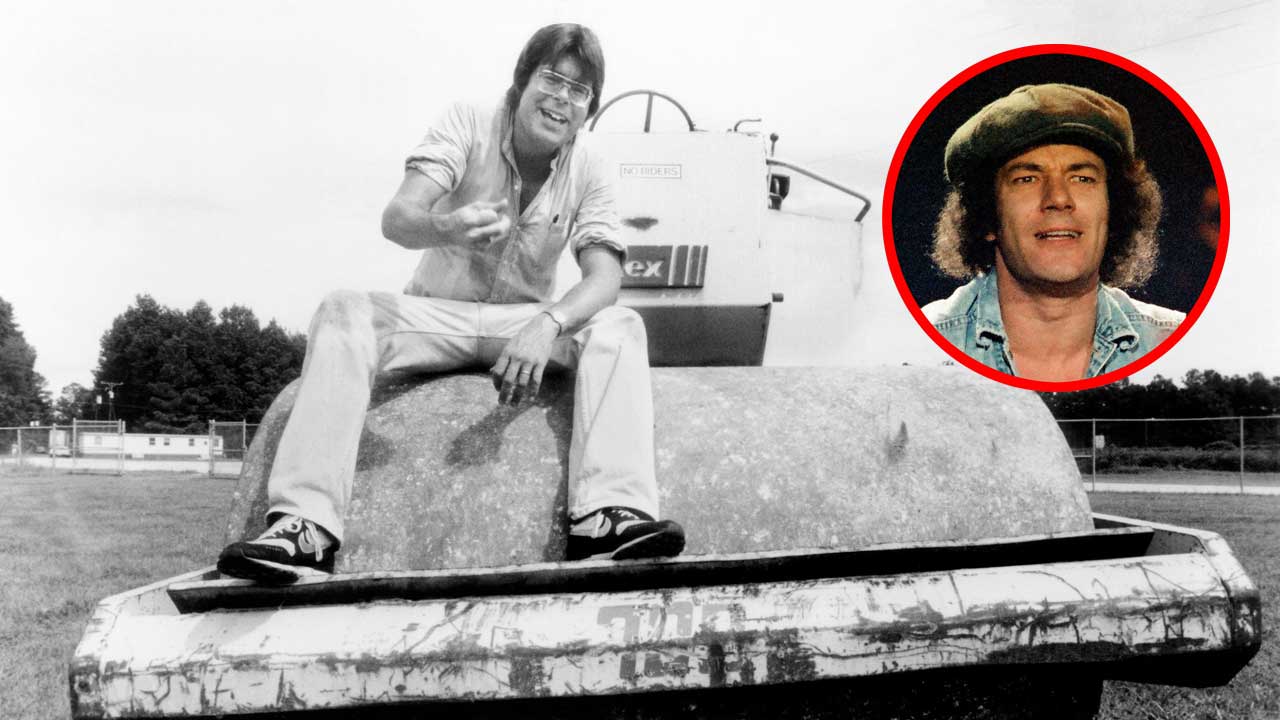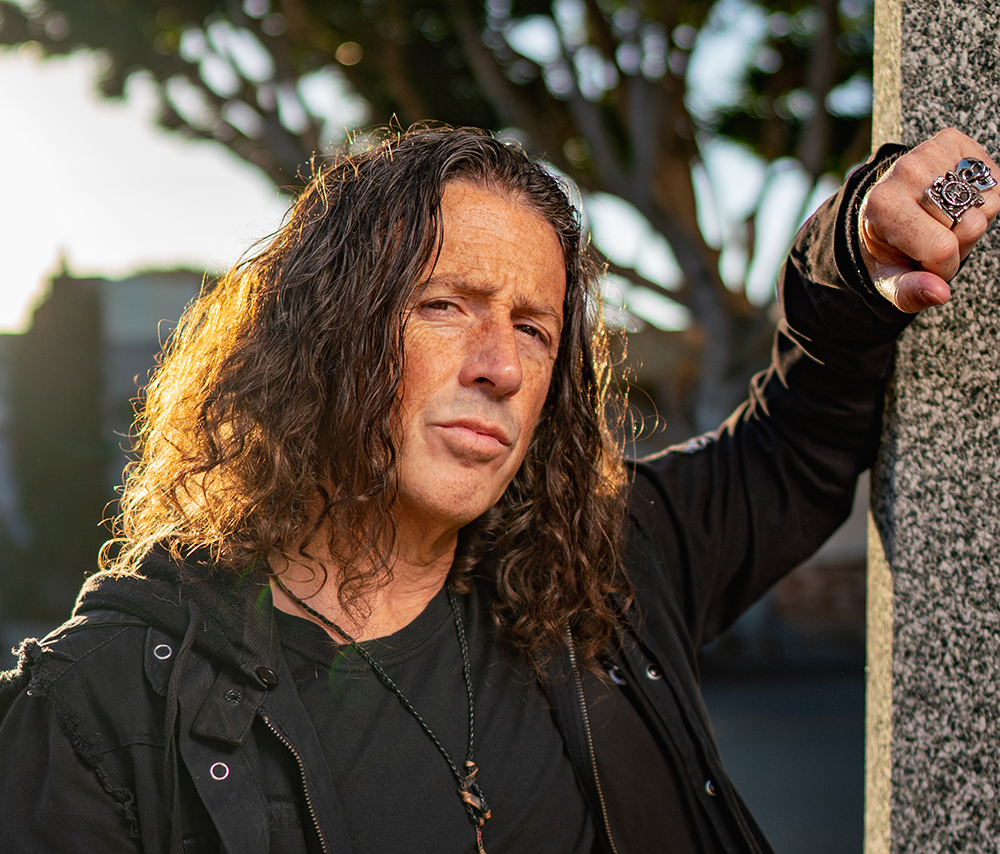"I really didn’t know what I was doing": Watch horror icon Stephen King's awkward fanboy interview with AC/DC
In 1986, a coked-up Stephen King directed his first feature film, Maximum Overdrive - then engaged in a goofy trans-Atlantic interview with AC/DC, who provided the soundtrack

Select the newsletters you’d like to receive. Then, add your email to sign up.
You are now subscribed
Your newsletter sign-up was successful
Want to add more newsletters?

Every Friday
Louder
Louder’s weekly newsletter is jam-packed with the team’s personal highlights from the last seven days, including features, breaking news, reviews and tons of juicy exclusives from the world of alternative music.

Every Friday
Classic Rock
The Classic Rock newsletter is an essential read for the discerning rock fan. Every week we bring you the news, reviews and the very best features and interviews from our extensive archive. Written by rock fans for rock fans.

Every Friday
Metal Hammer
For the last four decades Metal Hammer has been the world’s greatest metal magazine. Created by metalheads for metalheads, ‘Hammer takes you behind the scenes, closer to the action, and nearer to the bands that you love the most.

Every Friday
Prog
The Prog newsletter brings you the very best of Prog Magazine and our website, every Friday. We'll deliver you the very latest news from the Prog universe, informative features and archive material from Prog’s impressive vault.
In 1986, horror overlord Stephen King released his directorial film debut with Maximum Overdrive, a campy, ninety-eight minute schlock-fest starring Emilio Estevez as heroic diner cook Bill Robinson.
Based on King’s short story Trucks, the plot involves an errant comet kickstarting a radiation storm on Earth – stay with us here – that instantly imbues all machines with malevolent consciousness. Possessed of murderous intent, the machines turn against humankind and next thing you know, we’re in a truck stop in North Carolina where Estevez and a band of plucky survivors attempt to hold off a gang of homicidal trucks.
The film was an unqualified bust. Rotten Tomatoes’ Tomatometer rates the film a dismal 15%, with a slightly-kinder-but-still-horrible audience score of 50%. In the 2003 book, Hollywood’s Stephen King, the author ascribes the film’s abject failure not to a lack of directing experience however, but to an overabundance of something else.
“The problem with that film,” King said, “is that I was coked out of my mind all through its production, and I really didn’t know what I was doing.”
The movie’s soundtrack was a different story. By 1986, AC/DC badly needed a shot in the arm. After releasing Powerage in 1978, they had jettisoned their Midas-fingered production team of Harry Vanda and George Young (older brother to guitarists Angus and Malcolm) and hired Robert John "Mutt" Lange for back-to-back masterpieces Highway To Hell and Back In Black, but by the mid-80s, the creative well had run dry.
Since 1981, AC/DC had dropped an uninspired string of lukewarm albums packed with enough filler to insulate a palace (For Those About To Rock We Salute You, Flick Of The Switch, Fly On The Wall). While each album had one or two legitimate hits, the conspicuous erosion of quality had converted them from an album band to a singles band and the rise of hair metal was pushing the ageing rockers ever deeper into the margins.
Enter coked-up Stephen King to the rescue! King has long been a massive AC/DC fan. In a 2013 Reddit AMA, he ranked them behind only Creedence Clearwater Revival among his favourite bands. And in 1986, he desperately wanted them to score his movie. Reportedly, King tracked the band down and sang Ain’t No Fun Waiting Round To Be A Millionaire – a smouldering blues number from Dirty Deeds Done Dirt Cheap – to the band, in its entirety. They loved King and, seeing this movie soundtrack as a possible foothold back to relevance, agreed to do the score.
Sign up below to get the latest from Classic Rock, plus exclusive special offers, direct to your inbox!
For years, AC/DC had steadfastly refused to repackage their old material as a cheap way to milk their fans for easy cash. For the movie, they struck a compromise – in addition to releasing six previously-released tracks (including massive hits like You Shook Me All Night Long and Hells Bells, along with lesser-known fare like Ride On, Sink the Pink and Shake Your Foundations), they released two new instrumentals – D.T. and Chase The Ace. They also penned the movie’s theme song, Who Made Who, which kicked into gear after the film opened with a cameo from King himself.
Wisely, for the new material, the band reunited with producers Vanda and Young – a decision that proved inspired. The album Who Made Who peaked at 33 in the US and 11 in the UK and its title track skyrocketed to the top of the charts.
Which brings us to this grainy little slice of history, in which Stephen King, guesting as an MTV VJ, interviews singer Brian Johnson, guitarist Angus Young and bassist Cliff Williams over in London (cliché alert: Tower Bridge is in the background). The sound is sketchy but the banter is sketchier. Sporting an AC/DC band t-shirt, King reclines in a chair and, holding a telephone to his ear, speaks to the band on a TV screen in front of him.
“I’ve never directed a picture before,” he says, “and you’ve never done music for a picture before. What do you think about it? What kind of an experience was it and how did it all work out for you, once you got down to it?”
The sound quality, the ambient noises of London and Johnson’s syrupy Geordie accent make it difficult to understand at times, but he seems to reply, “It was an interesting thing. It was the first time I’ve been involved in anything like that. The lads said it was a bit like moving making because they had to be watching the clips (makes a cutting gesture) spot on...”
He’s describing the process where musicians watch a cut of the film with timing controls displayed along the bottom while recording the score in order to match the music and the footage with precision.
“It certainly was different for us to work with film,” says Angus.
Brian adds, “It was exciting watching the spooky bits.”
There’s a bit of banter and chuckling on both sides of the call. Then, almost as if he hadn’t made these very points a minute earlier, King says, “Well listen, I’ve never directed a picture before, you guys never did a soundtrack before and I’ve never been a VJ before so I wonder how you’d like to do my job and interview the next video – which you guys did.”
The band introduce the video and the clip cuts back to another thirty seconds discussing filming a new video for You Shook Me All Night Long. Apart from the withered production and awkward back-and-forth, there’s a charming undercurrent within this interview. King is very much in “aw shucks” fan guy mode and the band are as goofy and unpolished as you like. This was the era before mobile phones, Zoom and the Internet so it’s reasonable to assume that there’s a novelty factor for all parties involved to be having this real time chat on air, live, from different continents.
Ultimately, the movie’s dreadful performance had no lasting impact on the band or the author. King has now been clean and sober for over three decades and in the wake of Maximum Overdrive, his novels and stories have generated utterly transfixing film adaptations such as Stand By Me, The Green Mile and of course, The Shawshank Redemption.
And in truth, history has been kind to Maximum Overdrive. Devoid of even modest expectations, the film now has a breezy, drive-in sentimentality that makes it almost fun to watch. But its abysmal critical and commercial reception prompted AC/DC to make a band resolution to steer clear of movie soundtracks from that point on. Of course, the resolution did not last long and their music has since appeared in approximately seventeen bazillion soundtracks ever since.
Hailing from San Diego, California, Joe Daly is an award-winning music journalist with over thirty years experience. Since 2010, Joe has been a regular contributor for Metal Hammer, penning cover features, news stories, album reviews and other content. Joe also writes for Classic Rock, Bass Player, Men’s Health and Outburn magazines. He has served as Music Editor for several online outlets and he has been a contributor for SPIN, the BBC and a frequent guest on several podcasts. When he’s not serenading his neighbours with black metal, Joe enjoys playing hockey, beating on his bass and fawning over his dogs.

